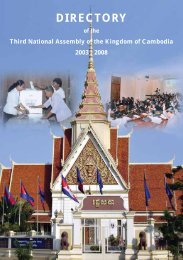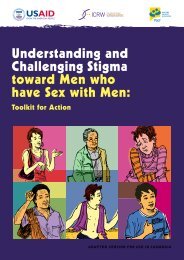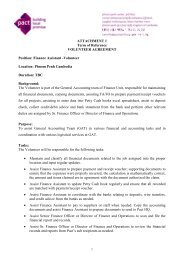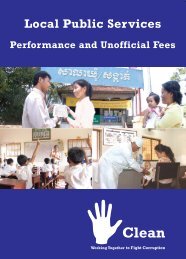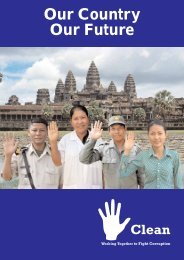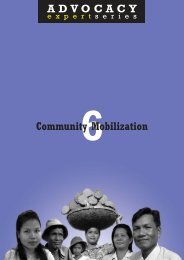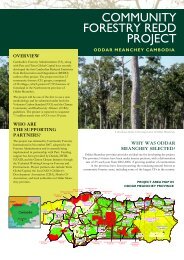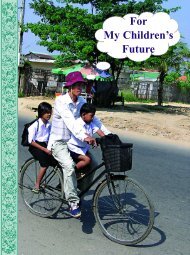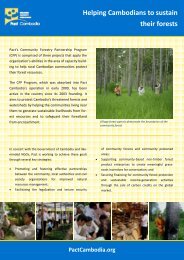Advocacy in Cambodia: Increasing Democratic ... - Pact Cambodia
Advocacy in Cambodia: Increasing Democratic ... - Pact Cambodia
Advocacy in Cambodia: Increasing Democratic ... - Pact Cambodia
You also want an ePaper? Increase the reach of your titles
YUMPU automatically turns print PDFs into web optimized ePapers that Google loves.
healthcare. While many women know that they<br />
have the right to live free from abuse, they do not<br />
file crim<strong>in</strong>al charges aga<strong>in</strong>st abusive husbands or<br />
<strong>in</strong>itiate divorce proceed<strong>in</strong>gs because they believe<br />
that do<strong>in</strong>g so will make their children suffer. From<br />
an economic standpo<strong>in</strong>t, it is not clear that the<br />
situation of women has improved over the last<br />
decade. A total 66% of women <strong>in</strong> <strong>Cambodia</strong> are<br />
unpaid family workers and therefore do not ga<strong>in</strong><br />
any economic power from their labor. Therefore,<br />
though women’s advocacy <strong>in</strong> <strong>Cambodia</strong> is mak<strong>in</strong>g<br />
progress, it will be some time before average<br />
women will be able to assert their rights.<br />
Build<strong>in</strong>g Capacity with<strong>in</strong> Civil Society<br />
With<strong>in</strong> the NGO community, women manage<br />
many local organizations. Women work<strong>in</strong>g <strong>in</strong><br />
NGOs benefit from more opportunities to travel,<br />
study abroad, attend <strong>in</strong>ternational conferences,<br />
and take leadership positions. It has become<br />
common practice for potential NGO employers to<br />
encourage applications by women. As a result of<br />
these benefits, women NGO leaders have become<br />
articulate, experienced, and have a certa<strong>in</strong> amount<br />
of legitimacy when deal<strong>in</strong>g with the government.<br />
They can make presentations at <strong>in</strong>ternational<br />
conferences, organize demonstrations and<br />
marches, and launch extended advocacy<br />
campaigns.<br />
To a much lesser degree, representatives of<br />
civil society groups and local associations are<br />
beg<strong>in</strong>n<strong>in</strong>g to ga<strong>in</strong> recognition for their leadership<br />
skills as well. In isolated cases, proactive women<br />
from villages have come to Phnom Penh to<br />
advocate for support for a particular problem their<br />
community is experienc<strong>in</strong>g.<br />
At the grassroots level, advocacy rema<strong>in</strong>s<br />
limited, particularly due to personal constra<strong>in</strong>ts<br />
and burdens encountered by women, a lack of<br />
support for women to play leadership roles, and<br />
perhaps even a lack of role models.<br />
Networks<br />
The number of women’s NGO networks,<br />
government networks, <strong>in</strong>ter-m<strong>in</strong>isterial networks,<br />
and government-NGO networks exceeds those<br />
found <strong>in</strong> other sectors. Most of these networks<br />
focus on women’s rights as a key way of chang<strong>in</strong>g<br />
the situation of women. Some networks are active,<br />
while others have very few activities or are<br />
<strong>in</strong>active. While some networks competently use<br />
coord<strong>in</strong>ation as a means to achiev<strong>in</strong>g a specific<br />
objective, such as NGO parallel reports to the<br />
CEDWA, others appear to have meet<strong>in</strong>gs as their<br />
primary objective.<br />
As women’s issues are demand<strong>in</strong>g on NGO<br />
leaders and resources are scarce, women’s groups<br />
would benefit from com<strong>in</strong>g together to establish<br />
Demonstrators marched from the <strong>Cambodia</strong>na<br />
Hotel to Wat Phnom as part of Women’s Day<br />
2002 events.<br />
a map of the various networks and identify where<br />
their organization fits on the map. This exercise<br />
would help identify opportunities for collaboration<br />
(such as us<strong>in</strong>g the same material for the CEDAW<br />
report and the NGO Statement to the Consultative<br />
Group Meet<strong>in</strong>g), and elim<strong>in</strong>ate duplication of<br />
effort. One of the negative effects of hav<strong>in</strong>g so<br />
many networks is that lack of proper oversight of<br />
one network may adversely affect the reputation<br />
of other women’s networks.<br />
One suggestion has been to br<strong>in</strong>g all the<br />
networks together beneath one umbrella. Under<br />
such a model, women’s groups could identify subcommittees<br />
for specific activities, topics, or events,<br />
which could assemble and disband as occasions<br />
require. This would enable NGOs to participate <strong>in</strong><br />
selected activities of particular <strong>in</strong>terest to them,<br />
while rema<strong>in</strong><strong>in</strong>g <strong>in</strong>formed of the outcome of other<br />
efforts.<br />
F<strong>in</strong>ally, most networks have NGO staff as<br />
their members but limited or non-existent<br />
representation of non-NGO women. Networks<br />
should consider <strong>in</strong>clud<strong>in</strong>g women from the<br />
grassroots and government levels <strong>in</strong> the future.<br />
References<br />
<strong>Cambodia</strong>n NGO Committee on CEDAW, 2001. Parallel Report on<br />
Elim<strong>in</strong>ation of All Forms of Discrim<strong>in</strong>ation Aga<strong>in</strong>st Women <strong>in</strong><br />
<strong>Cambodia</strong>. Phnom Penh, <strong>Cambodia</strong>.<br />
M<strong>in</strong>istry of Women’s Affairs, 1996. Household Survey on Domestic<br />
Violence <strong>in</strong> <strong>Cambodia</strong>. M<strong>in</strong>istry of Women’s Affairs and Project<br />
Aga<strong>in</strong>st Domestic Violence, Phnom Penh, <strong>Cambodia</strong>.<br />
Project Aga<strong>in</strong>st Domestic Violence, 1998. Divorce and Domestic<br />
Violence <strong>in</strong> <strong>Cambodia</strong>. Phnom Penh, <strong>Cambodia</strong>.<br />
Zimmerman, Cathy, 1994. Plates <strong>in</strong> a Basket Will Rattle: Domestic<br />
Violence <strong>in</strong> <strong>Cambodia</strong>. Project Aga<strong>in</strong>st Domestic Violence, Phnom<br />
Penh, <strong>Cambodia</strong>.<br />
Footnotes<br />
1<br />
Extracted from: <strong>Cambodia</strong>n NGO Committee on CEDAW, 2001.<br />
Second Parallel Report on Elim<strong>in</strong>ation of All Forms of Discrim<strong>in</strong>ation<br />
Aga<strong>in</strong>st Women, Phnom Penh, <strong>Cambodia</strong>.<br />
Case Studies<br />
81



